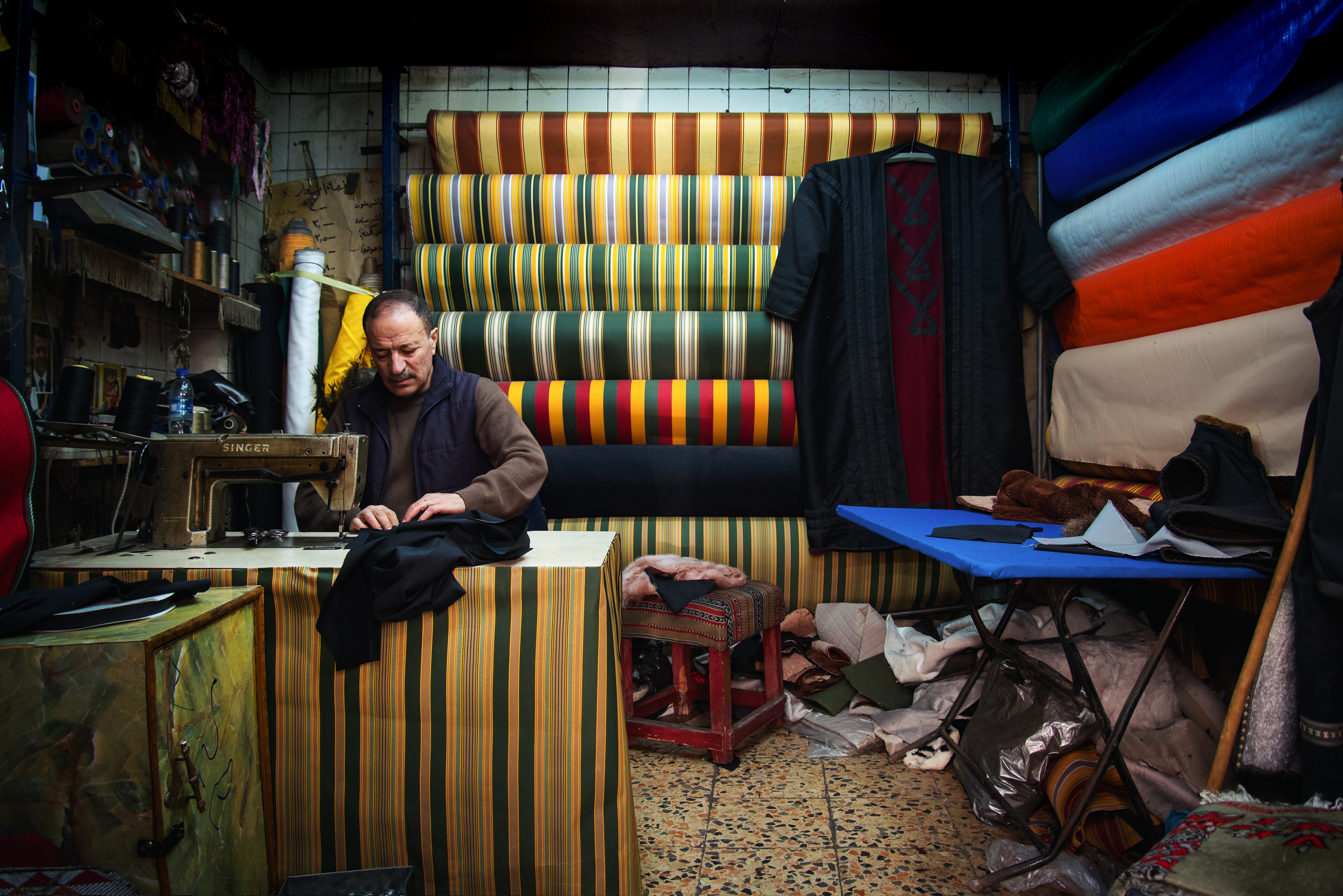 Man in textile shop in Jordan. (Seersa Abaza/ Shutterstock.com)
Man in textile shop in Jordan. (Seersa Abaza/ Shutterstock.com)
A large segment of youth across the MENA region are engaged in the informal sector as unregistered micro-entrepreneurs and informal workers. For some, working informally is a choice; for the vast majority, it is their only option. Raising their productivity is essential to rebuilding the region’s social contract after the COVID-19 pandemic.
Our knowledge about the size of MENA’s informal sector is limited, not in the least because of restricted data accessibility in the region. But we know from the latest regional study that in the early 2000s, the percentage of the labor force not contributing to social security ranged from 32% in Libya to 45% in Egypt, 70% in Morocco, and nearly 90% in Yemen. As MENA countries have experienced changes, including the rise of gig work, the extent of informality may have increased substantially. One example: data from Egypt’s Household Income, Expenditure, and Consumption Survey (HIECS) from 2017-18 shows that more than 60 percent of all workers are informally employed. Agriculture, construction, wholesale, and retail trade have particularly high shares of informal workers.
Decision makers used to ignore the informal sector. This is changing. Governments are now looking for solutions to “formalize” the informal sector, or to better include it as a part of their countries’ social compact. They now recognize that informal workers generate invaluable goods and services for millions of MENA’s residents: cooked meals, home repairs, transportation, and cleaning services, just to name a few. Still, when these informal workers interact with local authorities, they are often considered a nuisance and usually get harassed by police for operating without a permit. Yet, they typically commit no transgression other than trying to eke out a living for their families in economies that lost the ability to generate better formal job opportunities.
The World Bank’s 2020 Poverty and Shared Prosperity Report shows how, globally, the COVID-19 pandemic has hit the incomes of informal workers especially hard. Many of them now fall among the new poor. Phone survey data suggest that MENA is no exception, even though several countries in the region have responded with cash transfers to help informal workers cope with income losses. As dissatisfaction rises to unprecedented levels and the economic contribution of those in the informal sector continues to be underappreciated, governments need to size up the needs and the potential of this industry. Post COVID-19, the region needs a more positive public policy engagement with the informal sector.
Informal workers reside at the bottom of the economic pyramid. They do tough jobs with limited security or health insurance where they earn low incomes. They own few assets and generally have low productivity. Most informal workers do not qualify for social safety net programs, even though they are vulnerable to falling into poverty. Building back better requires fixing these problems and increasing economic opportunities for these workers. When their incomes increase, poverty declines, life satisfaction increases, and the terms of the social contract improve.
One way to improve economic opportunities for informal workers is to enlarge the span of formality in the job market, focusing on increasing competition, stimulating innovation, and creating a dynamic business environment—all part of the World Bank’s jobs and economic transformation (JET) agenda.
But generating good jobs takes time, and studies show that informal workers in MENA have a low probability of transitioning to formal jobs. The same holds for micro and small, informal enterprises. So, while we continue to focus on unlocking job creation in the formal sector, we must be pragmatic and sharpen our attention on the productivity and business ecosystem of those at the bottom of the pyramid.
A first priority should be building up the productive assets and skills of informal workers. Years of supporting microfinance and skills training has yielded important lessons such as the value of social capital, the importance of studying who participates in these programs, the differential impacts on business activity and welfare, the importance of tailoring programs to context, and the enormous potential of combining capital access with skills.
The next priority is building a conducive business environment for the informal sector. Informal businesses absorb public resources without paying taxes, but they are also an important source of job creation and value addition. Harassment by state officials should, therefore, be changed toward organization and formalization. For instance, markets and zoning laws are needed that allow street vendors to operate securely and close to their customers. This may improve health and safety standards and permit the collection of service fees. Government efforts to address criminal and illegal activities that are harmful to societies need to be stepped up. A supportive ecosystem also requires a legal and regulatory environment that stimulates sources of capital that are better tailored to the markets they serve—for instance, the development of financial products for the informal sector such as micro-leasing or informal sector credit scores.
Another important element is social insurance that covers informal workers without requiring them to formalize. Expanding and leveraging digital technologies (such as the digital platform Halan in Egypt) could be another pillar, particularly when it offers a secure way for informal businesses and workers to interact with customers and find jobs.
Finally, more data and better monitoring will be needed. It is difficult to design good policies in the absence of data. Fortunately, much of the needed information has been collected. Making this data accessible to policy analysts and researchers is a no-cost step toward solid, evidence-based policies that can benefit millions.
As governments realize the potential of the informal sector, they are seeking solutions and advice to reap its economic and social benefits. The World Bank is ready to help.
This is the third in a series of blogs by Ferid Belhaj (Vice President for MENA) on what the World Bank can do to help navigate the COVID-19 pandemic and its socio-economic consequences. This blog is co-authored by Nistha Sinha and Johannes Hoogeveen of the MENA Poverty and Equity Global Practice.




Join the Conversation